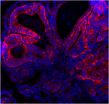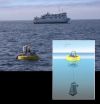The study finds that Millennials consume news and information in strikingly different ways than did previous generations. Contrary to popular perception, they keep up with news that is commonly referred to as "traditional" or "hard," as well as stories that connect them to hobbies, culture, jobs, and entertainment. This study was conducted jointly by the American Press Institute and the Associated Press-NORC Center for Public Affairs Research.
"This is the second study we have conducted that challenges some common perceptions about news in the digital age," said Tom Rosenstiel, executive director of the American Press Institute. "This one finds that across a range of metrics, the first digital generation is highly engaged. If anything, the enormous role of social media appears to have a widening impact, not a narrowing one, on the awareness of this generation."
Among the study's findings: Fully 69 percent of Millennials report getting news at least once a day--40 percent several times a day.
Millennials say they acquire news for a variety of reasons, which include a fairly even mix of civic motivations (74 percent), problem-solving needs (63 percent), or social factors (67 percent) such as talking about it with friends.
Contrary to the idea that social media creates a polarizing "filter bubble," exposing people to only a narrow range of opinions, 70 percent of Millennials say that their social media feeds are comprised of a diverse mix of viewpoints evenly mixed between those similar to and different from their own. An additional 16 percent say their feeds contain mostly viewpoints different from their own. And nearly three-quarters of those exposed to different views (73 percent) report they investigate others' opinions at least some of the time--with a quarter saying they do it always or often.
Facebook has become a nearly ubiquitous part of digital Millennial life. On 24 separate news and information topics studied, Facebook was the No. 1 or No. 2 gateway to learn about 20 of them.
While Millennials are highly equipped, it is not true they are constantly connected. More than 90 percent of adults age 18-34 surveyed own smartphones, and half own tablets. But only half (51 percent) say they are online most or all of the day.
"For many Millennials, news is part of their social flow, with most seeing it as an enjoyable or entertaining experience," said Trevor Tompson, director of the AP-NORC Center. "It is possible that consuming news at specific times of the day for defined periods will soon be a thing of the past given that news is now woven into many Millennials' connected lives."
About the Survey This study was conducted by the Media Insight Project, a collaboration between the American Press Institute and the AP-NORC Center for Public Affairs Research. It included two components--a quantitative survey of Millennials nationwide and qualitative interviews and follow-up exercises with small friend groups of Millennials in Chicago, Illinois; San Francisco and Oakland, California; and at the University of Mary Washington in Fredericksburg, Virginia. The survey was conducted January 5-February 2, 2015, and reached 1,046 adults nationwide between the ages of 18 and 34. Study recruitment was completed through a national probability telephone sample, while the main portion of the questionnaire was administered online. The margin of error was +/- 3.8 percentage points. A full description of the study methodology can be found at the end of the report.
The proper description of the survey's authorship is as follows: This study was conducted jointly by the American Press Institute and the Associated Press-NORC Center for Public Affairs Research.
INFORMATION:
About the Media Insight Project
The Media Insight Project is a collaboration between the American Press Institute and the AP-NORC Center for Public Affairs Research with the objective of conducting high-quality, innovative research meant to inform the news industry and the public about various important issues facing journalism and the news business. The Media Insight Project brings together the expertise of both organizations and their respective partners, and involves collaborations among key staff at the American Press Institute, NORC at the University of Chicago, and the Associated Press.
http://www.mediainsight.org/
About the American Press Institute
Founded in 1946, The American Press Institute conducts research, training, convenes thought leaders and creates tools to help chart a path ahead for journalism in the 21st century. The Press Institute is an educational non-advocacy 501(c)3 nonprofit organization affiliated with the Newspaper Association of America. It aims to help the news media, especially local publishers and newspaper media, advance in the digital age.
http://www.pressinstitute.org
About the Associated Press-NORC Center for Public Affairs Research
The AP-NORC Center for Public Affairs Research taps into the power of social science research and the highest-quality journalism to bring key information to people across the nation and throughout the world.
http://www.apnorc.org
The Associated Press is the essential global news network, delivering fast, unbiased news from every corner of the world to all media platforms and formats. Founded in 1846, AP today is the most trusted source of independent news and information. On any given day, more than half the world's population sees news from AP.
http://www.ap.org.
NORC at the University of Chicago delivers objective data and meaningful analysis to help decision-makers and leading organizations make informed choices and identify new opportunities. Since 1941, NORC has applied sophisticated methods and tools, innovative and cost-effective solutions, and the highest standards of scientific integrity and quality to conduct and advance research on critical issues. Today, NORC expands on this tradition by partnering with government, business, and nonprofit clients to create deep insight across a broad range of topics and to disseminate useful knowledge throughout society. Headquartered in downtown Chicago, NORC works in over 40 countries around the world, with additional offices on the University of Chicago campus, the DC metro area, Atlanta, Boston, and San Francisco.
http://www.norc.org
The two organizations have established the AP-NORC Center for Public Affairs Research to conduct, analyze, and distribute social science research in the public interest on newsworthy topics, and to use the power of journalism to tell the stories that research reveals.
Contact: For more information, contact Eric Young for NORC at young-eric@norc.org or 703-217-6814 (cell); Ray Boyer for NORC at boyer-ray@norc.org or 312-330-6433; or Paul Colford for AP at pcolford@ap.org or info@apnorc.org; or Kevin Loker for API at kevin.loker@pressinstitute.org or 605-630-3309.


